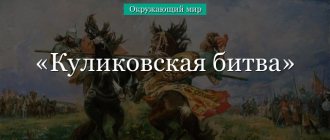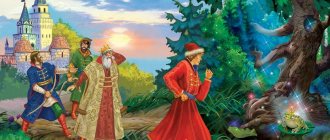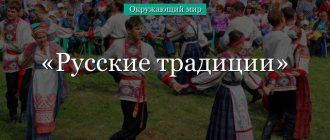What do our fairy tales teach?
Russian folk tales teach goodness, good always defeats evil, but the path to victory can be too long.
Fairy tales give the child the first idea of such concepts as good and evil, wisdom and deceit, forgiveness, compassion. If you believe in yourself and don’t deviate from your principles, everything will work out. In the images of fairy-tale heroes, in their interaction with the outside world, the realities of life are adapted for children's perception. Children perceive everything, and even if they don’t realize the morality that the text contains, they at least try to be like the kind, sympathetic and resourceful heroes. Russian folk tales introduce the child to the vast universe in which he will have to live, with its physical laws, wildlife, history and culture.
What do fairy tales teach for children and what fairy tales are best to read to a child?
08/08/2016, 20:51 Modified: 09/29/2021, 08:30
We all grew up reading fairy tales. These wonderful stories, in which magic was intertwined with intrigue, good always defeated evil, numerous adventures and terrible dangers awaited the heroes, excited our imagination and made our dreams more colorful and exciting. As a child, our parents or grandparents read to us, and now many of us read fairy tales to our own children.
Fairy tales for babies are not just a good time or a way to put children to sleep, they are a very effective and yet unobtrusive method of teaching. The benefits of reading are known to everyone, and this applies not only to some educational materials, but also to the simplest invented stories. A daily bedtime story for a child can do wonders for their development. He will become more attentive and diligent, because listening to the story to the end requires a lot of patience. The vocabulary will be replenished with a wide variety of new words and speech patterns. He will learn to reflect and think about the consequences of his own and others' actions. Not to mention how fairy tales develop imagination, relax and even motivate. Children who learn to love fairy tales in childhood will undoubtedly carry this love of books into adulthood.
What do fairy tales teach?
Fairy tales give a child a first impression of the world and human relationships. Yes, we are talking about made-up worlds and made-up people, but the situations in which the heroes of children's stories find themselves invariably carry some kind of moral or clear example for the younger generation. The fact that good always triumphs over evil is perhaps the worst cliché for adults, but for children it is the only correct option. They often associate themselves with heroes not only of books, but also of comics, who tirelessly save people and fight evil. Many of our ideals and moral values come from fairy tales that taught us from a young age what is good and what is bad:
- Kindness, justice, generosity, selflessness are the qualities of a real hero . Children who want to be like their favorite hero will strive to develop good qualities in themselves
- Villains sooner or later have to answer for their actions . In fairy tales, villains are always deceitful, cowardly and cruel people. And always, without exception, their atrocities come to an end. Simply put, they show children how not to behave and that bad behavior results in punishment.
- For the heroes, too, not everything comes easy right away; they have to overcome difficulties along the way . The fact that even mighty heroes and princesses have to work and make a lot of effort to win teaches children that nothing in life is given for nothing, that hard work is needed even for those who are naturally talented and strong
- Anyone can become a hero . Often in fairy tales, the hero becomes a good-natured and simple-minded guy, whom everyone made fun of at the beginning. People who are often underestimated can also triumph, the main thing is not to pay attention to ridicule and not allow others to lower themselves and their abilities.
- Strength isn't everything . Of course, everyone loves fairy tales about heroes who can uproot a hundred-year-old oak tree with one hand and slay a dragon with the other. But physical superiority does not always help find a way out of the situation. It is important to be quick-witted and smart to be able to outsmart your enemies.
- It is not always possible to cope alone . The ability to make friends, help each other and work in a team is one of the most important knowledge that a growing member of society needs. Whatever one may say, a person constantly has to communicate with someone, work with someone and get along with someone, which is why fairy tales so often emphasize teamwork, letting the child understand that no matter how strong the main character is, he also needs help and support from friends.
What fairy tales are better to read?
It's never too early to start reading fairy tales to your child. Fairy tales for children vary by age, but it’s best to start as early as possible. Of course, at the very beginning, the newborn will not understand the meaning of your words, so it doesn’t matter what kind of fairy tales you read to him. A mother's or father's soothing voice will help the child relax. Until one year of age, you can recite or hum little rhymes, songs, and show your baby color pictures. Then move on to the simplest classic stories like everyone’s favorite “Kolobok”. Stories about animals with beautiful illustrations are best.
After 3 years, you can already bring people into the picture, how they interact with animals, with each other. At the same time, the plot still remains simple and clear with a predictable happy ending. From the age of 4, you can already diversify your stories a little. Bring a little magic and wonder, show the child new worlds where everything is different. And from the age of 5, move on to more complex and exciting fairy tales with adventures, heroes, wizards and other fairy tales.
If you run out of books or collections, you can always find new fairy tales for children on the Internet. Or try to come up with a story together.
Remember that fairy tales are a great opportunity to spend time with your children. Don't brush them off if they ask to read a story, take the time and chances are you'll have as much fun as your little ones.
What fairy tales should you read in the summer? Check out the link for summer reading.
Heroes of Russian fairy tales
The main character of a fairy tale is always courageous and fearless. He overcomes all obstacles on the path to his happiness. In the course of the adventures, the hero undergoes a transformation: Ivan the Fool, simple-minded and lazy, at the end of the fairy tale necessarily turns into a handsome young man and marries the princess.
Other characters help the hero overcome trials: wonderful animals, wise advisors. But help is not given so easily: even Baba Yaga helps the hero if he shows himself to be hardworking, well-mannered and purposeful. This expresses popular ideas about human morality and morality. Wonderful helpers have magical means (flying carpet, walking boots) that personify people's dreams.
Women in Russian folk tales are always unusually beautiful and smart. Intelligence, beauty, hard work, resourcefulness, a mandatory attribute - a braid to the waist (hair was previously associated with vitality) - all these are traits that, in the popular imagination, should be present in any girl.
The protagonists of the main characters are dark, evil forces (Kashchei the Immortal, Zmey Gorynych). They are cunning, cruel, greedy - this is how the concept of violence and evil is expressed in the minds of the people. The more terrible the monster, the more significant the feat of the main character seems. But the fight against dark forces is carried out not only with the help of strength and intelligence: the popular consciousness sometimes endows villains with comic stupidity, because of which they fall into traps set by the main character.
Literary reading 2nd grade. Message on the topic “What do fairy tales teach” - where to find/download?
Write a short message on the topic “What fairy tales teach”
Answers on literary reading. 2nd grade. Workbook. Boykina
Children at school study a lot of fairy tales, and their parents read them to them, both folk and original ones. Therefore, answering the question What do fairy tales teach is not so difficult:
Well, since we need to start with these words, then we’ll start with them, only we’ll give them in quotation format so as not to harm the uniqueness of the answer:
I want to write in my message. what fairy tales teach us. Despite the fact that fairy tales do not show real life, they teach children very well very important things:
There are not many lines in the workbook
Let's start with what is proposed:
Actually, to complete this task, you can use not all the arguments I have proposed, but only part of them.
Fairy tales can be original and folk. Fairy tales have the unique ability to tell the reader about good, evil, and betrayal through magical characters. A fairy tale, more vividly than a story, can convey folk wisdom, talk about eternal values, teach how to act and not be a coward. The fairy tale hints to us that we need to be hardworking and responsive, then they will help you in difficult times.
In fairy tales, evil and lazy characters are left with nothing. On the other hand, we learn that we should not trust false words and promises, and should not be mistaken about the cunning of others.
Fairy tales teach us to be resourceful and kind.
They also teach that good always triumphs over evil.
They also show us that miracles happen, you just need to believe in them.
Meaning hidden from us
The main character, the bun, teaches us:
· Avoid trouble by cunning.
· Boasting can still lead to the fact that some “fox” may come across your path, which will turn out to be more cunning than you.
· People around you may not always be positive towards you. In reality, there may be hypocrites nearby.
In this tale we clearly see good and evil. Where the grandfather, grandmother, and bun are good, and the rest of the characters are evil. But initially the bun's tale was even more mysterious. The gingerbread man was the personification of the moon, which rolled across the sky and every constellation, and in the fairy tale the animals bit off a piece of it.
Option 2
Fairy tales, of course, teach. They do not, like in fables, have such a moral - at the end in a separate line, but everything is clear. The general direction is to learn goodness and defeat evil.
In fairy tales, it’s clear, everything is simple. Now, if only everything in life was like this: good and evil, white and black... The fairy tale teaches us to overcome obstacles, defeat evil, and not succumb to evil spells. They teach you to find your love, boldly move forward, and help everyone. Do not be afraid.
But they don’t teach you to analyze why, for example, Koschey is evil. Maybe he had an unhappy love, trauma in childhood... He became like this for a reason. That is, we teach the basics. In life, I think we need to apply these lessons carefully. They just get more complicated. It’s the same with everything – first we learn the basics, and then we complicate it.
In principle, all fairy tales are similar in that good wins. The poor hard worker receives help (usually magical), sets off on a journey (and this requires courage), encounters various difficulties, defeats everyone... And the hero also meets various magical creatures. Usually they help him, although sometimes he needs to pass tests. For example, Baba Yaga. Scary but powerful. Might as well eat it! But if you help her, he will give her, for example, a ball that shows the way. They say that similar things happen in life, but, of course, Yaga is no longer a grandmother, but, for example, a head teacher... And in the end you fight a monster, win, and become a prince. That is, a transformation occurs.
And I've also heard that fairy tales hint at an inner journey. That is, you try to understand yourself, to discover new qualities in yourself... You meet your “dragons,” at least the terrible beast - Laziness. You defeat him, and then you become a “prince,” that is, you discover new qualities and achieve your goal.
We can say that fairy tales, since they were repeated many times to new generations, have already entered the consciousness and subconscious in such a way that they influence humanity. The main thing is that they teach good, good even before religion, before the state...








